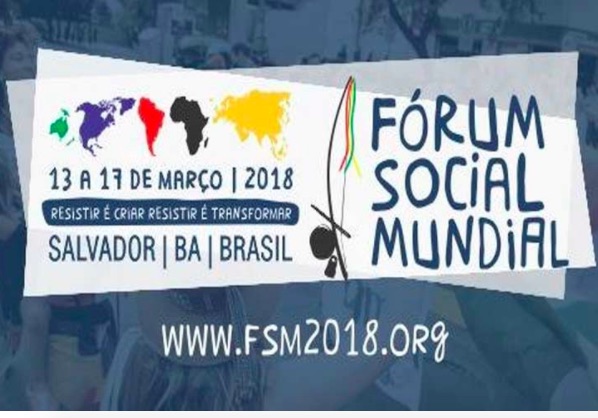FREE FLOW OF INFORMATION
Information from Radio Reloj Cuba, Prensa Latina and Prensa Latina
On March 14, with the cry of Fora Temer replicated in tens of thousands of voices, the Brazilian city of Salvador de Bahia opened its doors to the thirteenth World Social Forum.
The traditional march opened the meeting officially, with an intense program for which more than 1600 self-managed activities by groups, organizations and entities were registered.

(Click on photo to enlarge)
This Friday, the World Assembly of Women will take place, with more than twenty thousand participants and from which it is intended to constitute a single front to defend women´s rights and face machismo and violence.
Mariana Dias, President of the National Union of Students, pointed out that the meeting takes place in the midst of a difficult situation in Brazil and Latin America, marked by setbacks from the social and political points of view.
The conference began on Tuesday, March 13th and runs until Saturday, March 17th. . . .
Even before the opening march, the first denunciation launched here today at the World Social Forum was against the attempts of Michel Temer”s government to leave Brazilian civil society without a voice.
The denunciation was made at a press conference, after the public media network Brazil Communication Company (EBC) announced that it will not cover the event because its board did not authorize correspondents to travel here.
Shortly after taking the Presidency of the Republic, Temer eliminated the Curator Council of the EBC, appointed a new director by decree and changed the functional structure of the company.
On the importance of this 13th World Social Forum (WSF), President of the National Union of Students (UNE) Mariana Diasin told the media that the event is taking place in the middle of a difficult situation, not only in Brazil, but in Latin America and the world.
She said that in recent years there have been historical setbacks, from the social and political points of view, as a result ‘there is a perverse withdrawal of rights’, which were achieved after many years of struggle.
(Article continued in right column)
World Social Forums, Advancing the Global Movement for a Culture of Peace?
(Article continued from left column)
She said that Brazil is living a very delicate time after the interruption of the democratic process (with the parliamentary-judicial coup d’etat carried out in 2016 against constitutional President Dilma Rousseff) and currently a neoliberal agenda is implemented without taking into account the opinion and willingness of the people. . . .
This is the seventh time since its creation in 2001 that Brazil welcomes thousands of participants at the World Social Forum. . .
With a birth certificate in Porto Alegre, where it was held again in 2002, 2003, 2005 and 2012, the great meeting of social, people’s and trade union movements was also organized in 2009 by another Brazilian city, Belem.
Besides Brazil, another five nations were already witness to these events: India, in 2004; Kenya, in 2007; Senegal in 2011: Tunis, in 2013 and Canada, in its more recent edition of 2016.
In its Salvador de Bahia event, starting today with a grand march from Cmpo Grande until the Castro Alves square, in the ancient center of the city, the World Social Forum ‘has everything to i9mpact politically in the present situation’, valued the member of the Facilitating Group, Carlos Tiburcio.
For the journalist and director of the web Radio Democracia en el Aire – Red de Resistencia Democrática, there are strong reasons for this global venue to become a great trench of resistance to the offensive of international capital, and will also have special importance for tje social and political Brazilian forces.
According to the also founder of the Forum, over 1300 self-paid activities were already registered for the event, whose fundamental nucleus will take place in Campus Ondina, of the Federal University of Bahia.
The Forum’s program includes, among others, a colloquium on March 14 on the state of exception in Brazil and inequalities, democratic fragility and power of elites.
Work sessions of the meeting will start with the panel ‘Tutoring democracies: media, power and manipulation’, in charge of journalists Ignacio Ramonet and Martin Granovsky.
Other issues to be debated there are judicialization of politics or the politicization of justice; Inequalities: which, why and until when?; Racism, violence and discrimination: human rights in the coup d’état Brazil.
The colloquium will conclude with a debate about the left’s challenges: the fight for unity in an uncertain future, for which he announced the presence of director of the Center of Social Studies of Portugal, Boaventura de Sousa Santos.
As part of the program there will also be the World Women and Peoples Assemblies, Movements and Territories in Resistance, as well as the so-called convergence activities, the self-managed ones and others of political-cultural nature.